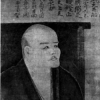Dogen

Dogen
Dōgen Zenji, also known as Dōgen Kigen, Eihei Dōgen, Koso Joyo Daishi, or Bussho Dento Kokushi, was a Japanese Buddhist priest, writer, poet, philosopher, and founder of the Sōtō school of Zen in Japan. Originally ordained as a monk in the Tendai School in Kyoto, he was ultimately dissatisfied with its teaching and traveled to China to seek out what he believed to be a more authentic Buddhism. He remained there for five years, finally training under Tiantong Rujing, an...